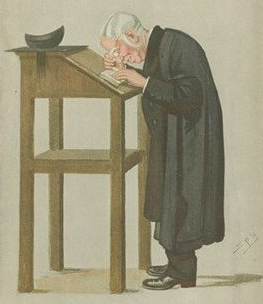Spoonerisms
by Chris Miller
Today, spooning in speakerisms. The University of Houston presents this series about the machines that make our civilization run, and the people whose ingenuity created them.
Have you ever seen a blushing crow? Or a eaten a belly jean? Do you know our 31st President, Hoobert Heever?
Those word pairs make no sense when you first hear them. But by switching whole words or syllables between words, we change the meaning of a phrase, often with funny or ironic results. We call this word play a Spoonerism, after the Reverend William Archibald Spooner.

William Archibald Spooner - Vanity Fair Photo Credit: Wikipedia
William Spooner was born in 1844 in London. He attended the New College, Oxford in England, where he was ordained as a deacon and, later, a priest in the Anglican Church. After graduating, he returned to New College as a lecturer, teaching philosophy, divinity and history. He spent his entire 60-year career there, ultimately becoming a dean, then warden of the college in 1903.
Students and colleagues alike admired Reverend Spooner, describing him as wise and intelligent. But they also remember him as somewhat clumsy, and he often reversed logic and transposed ideas. For instance, Spooner once spilled salt on the table at a university banquet. So he poured wine on the salt to clean it up - the complete opposite of the usual process.
Based on that description, you'd think that word gaffes filled Spooner's lectures. But this was not true. Like all of us, Spooner occasionally misspoke. For instance, he introduced a friend of his colleague, Dr. Child, as "Dr. Friend's child." But in interviews, Spooner only recalled one time where he accidentally uttered what we call a Spoonerism: He announced the Church hymn, "Conquering Kings Their Titles Take" as "Kinkering Congs Their Titles Take." Ironically, most of his students don't remember hearing even one Spoonerism in any of his lectures.
So why are these scrambled phrases named for Reverend Spooner? He certainly didn't invent them, nor was he the first to speak one. The first example of this type of word play in English dates back to the legend of King Arthur. Lancelot couldn't afford a horse, so he rode into the kingdom on a St. Bernard instead. A passerby commented, "I wouldn't send a knight out on a dog like this." Mixing words to make funny phrases became a popular parlor game in 19th century England. The fad even spread to the United States. Allegedly Abraham Lincoln loved them.
Surely, the endearing Reverend Spooner slipped up with an occasional Spoonerism in class. But it was probably his well-meaning students who thought up more Spoonerisms and attributed them to their beloved professor. Spooner soon became famous at Oxford, though he greatly disliked the attention. But everyone knew the legend.
Spoonerisms live on today, mostly through scripted comedy routines. Archie Campbell famously told the story of Cinderella as Rindercella, with Spoonerisms in every sentence.
So if you sit in the wrong section at Church, the usher may say: "I am sorry ma'am, but this pie is occupewed. May I sew you to another sheet?" Smile, politely move, and think of the kindly Reverend Spooner and the funny word slips that bear his name.
I'm Miss Criller (Chris Miller), along with the University of Houston, where we're interested in the "May" inventive "winds" work.
Theme Music
This episode is dedicated to Leonard Miller, who always keeps us laughing with Spoonerisms ("what will the thinkle peep?" [i.e., "what will the people think?"]) and other humor.
Short biographies of Reverend Spooner and examples of Spoonerisms can be found on Wikipedia (Spoonerism, William Archibald Spooner), Straight Dope and World Wide Words.
Douglas Hofstadter coined the terms, forkerism and kniferism to classify two specific types of Spoonerisms. A forkerism is the swapping of final consonants or sounds (for example, "felt pen" becomes "fen pelt"). A kniferism is interchanging the vowels between two syllables or words to change the meaning. One of the most famous kniferisms occurred when Harry von Zell introduced President Herbert Hoover as "Hoobert Heever" in 1931.
Many fun languages have been created by inserting nonsense syllables into words to encode them from naive outside listeners. The most popular is Pig Latin, where the beginning of a given word is moved to the end of that word followed by the suffix, "ay" (for example "Pig Latin" becomes "Igpay Atinlay"). Other examples include the Opp Language (or "Oppish") and Ubbi Dubbi (made popular in the PBS series, Zoom).